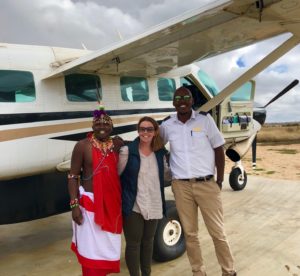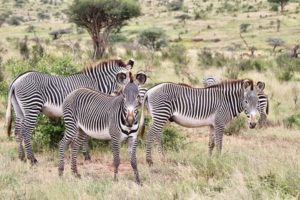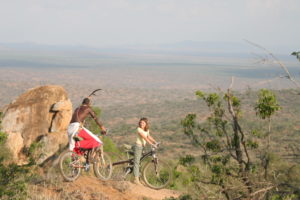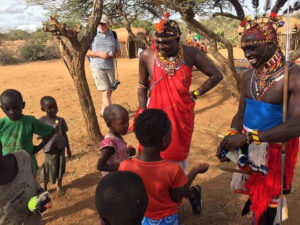Samuel Lengalai (Brown) is from a local village close to the Loisaba Conservancy and has worked in the conservancy for over 12 years. Whilst he undertook a number of roles before becoming a guide, his passion was always the wildlife and he enrolled on his first guiding course in 2010. Since then he has been growing his knowledge base and working his way through his guiding qualifications – now working towards his final (Gold) exam.

During a recent visit, I spoke to Brown about his love for his job, the region, and the wildlife and communities that call Loisaba home.
What do you think makes Loisaba so special?
The region is special because of its people, landscape, and unique wildlife. Loisaba also has a critical elephant corridor allowing for the safe movement of elephants and endangered species and this provides this wildlife safe and secure habitat with abundant resources required for them to thrive.
This region is made up of 42 different tribes (the dominant tribe being the Samburu), with small numbers of many ethnic groups which is really unusual – normally you’d only find one or two different groups in a region. But the people all interact well together. This successful interaction comes from everyone in the area (tourism businesses, research and conservation organisations and local communities) all working collaboratively with respect and with an understanding and appreciation of each other.
Tell us about the wildlife

You’ll find four (elephant, Cape buffalo, lion and leopard) of the Big Five here, and the conservancy has a progressive plan to reintroduce rhino to the region again after 50 years. There are and lots of other species besides, but the region also has a number of endemic species only found in the wild isolated areas of the most northern part of this truly diverse country: beisa, oryx, gerenuk, Jackson’s hartebeest, and the special grevy zebra which is larger in body size compared to the other species, stripes and also the social structure.
And your most memorable sighting to date?
Oh, this was an elephant giving birth early one morning. I realised what was happening and watched the scene unfold. As the female started to give birth she moved close to another female from the family unit and this was for the purpose of protection and support during labour: the rest of the unit waited a small distance away, but as the baby arrived they all ran towards the mother and they circled around her all sides – this was for protection, and some of them were excited and trying to touch the baby. The the baby got up within minutes of its birth, with the support of the mother and other family members. I felt extremely happy to see it happening: the labour was successful and it was such a special thing for me to witness and I felt so emotional. I stayed and watched as the family unit celebrated and I felt really connected to them all.
Any advice for visitors to the region?
 Get to meet the local people and better understand their rich culture. As well as the landscape and special animals, you can try lots of different activities in Loisaba like bush walks, cultural village visit, camel safari, horseback riding, mountain biking and more. The region is really good for children as they love all the active things they can do.
Get to meet the local people and better understand their rich culture. As well as the landscape and special animals, you can try lots of different activities in Loisaba like bush walks, cultural village visit, camel safari, horseback riding, mountain biking and more. The region is really good for children as they love all the active things they can do.
Tell us about your involvement in local community projects.
 I have worked to introduce conservation to the local people and help them to understand how wildlife and people can coexist by sharing land together, and that tourists can support our conservation. Tourism coming into our country helps local communities, providing them with surstainable livelihood,by giving them opportunities to educate their childrens, build health facilities and also opening up for them to engage into different projects like bead working for women, and cultural village visits for tourists to pay a visit into the village. The local people are now enjoying the fruits of the conservation effort done by Loisaba conservancy through different projects and also the support by Elewana also doing a project for the locals through Land & Life.
I have worked to introduce conservation to the local people and help them to understand how wildlife and people can coexist by sharing land together, and that tourists can support our conservation. Tourism coming into our country helps local communities, providing them with surstainable livelihood,by giving them opportunities to educate their childrens, build health facilities and also opening up for them to engage into different projects like bead working for women, and cultural village visits for tourists to pay a visit into the village. The local people are now enjoying the fruits of the conservation effort done by Loisaba conservancy through different projects and also the support by Elewana also doing a project for the locals through Land & Life.
For more details and the best places to stay in the region, check out Elewana Loisaba Tented Camp, Elewana Loisaba Lodo Springs and Elewana Star Beds.